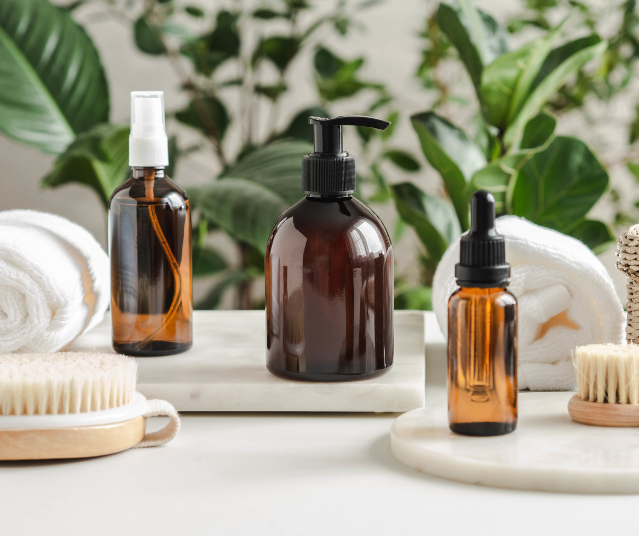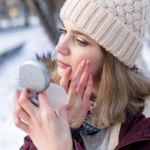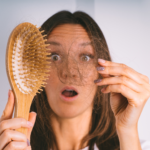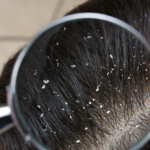In the vast world of skincare, finding the perfect product can feel overwhelming, especially with every skin type requiring specific attention. Whether your skin is dry, oily, sensitive, or combination, using the right products tailored to your skin’s needs is the key to achieving healthy, radiant skin. We have compiled a comprehensive guide on the best skincare products for every skin type to simplify your routine and maximize results.
Introduction
Skincare is not a one-size-fits-all solution. Each skin type has unique characteristics and challenges that require specific care. From cleansers to moisturizers, using the right skincare product for your skin type can significantly improve your complexion and overall skin health. Let’s break down the best skincare products tailored to dry, oily, sensitive, and combination skin, so you can craft a skincare routine that works for you.
Know More : Damaged Hair
Understanding Your Skin Type
Understanding your skin type is crucial for maintaining healthy, radiant skin. When you understand whether your skin is oily, dry, combination, sensitive, or normal, you can choose the right skincare products to address your skin’s specific needs. Using the wrong skincare products for your skin type can lead to irritation, breakouts, or dryness. In this guide, we’ll help you identify your skin type and explain how to select the best skincare products tailored to your skin’s unique characteristics.
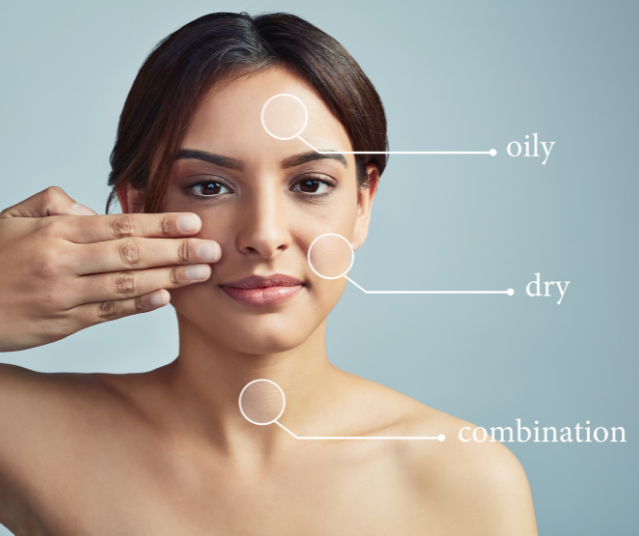
1. Why Understanding Your Skin Type is Important
Everyone’s skin is different, and using the wrong skincare products can make your skin issues worse. For instance, using harsh skincare products on dry skin can strip it of essential moisture, while applying heavy moisturizers on oily skin can clog pores and lead to breakouts. By identifying your skin type, you can select skincare products that nourish and enhance your skin, while preventing common skin problems like acne, sensitivity, and excessive dryness.
2. The Different Skin Types and How to Identify Yours
To properly choose the right skincare products, it’s important to first understand your skin type. Here’s a detailed look at the five primary skin types:
1. Oily Skin
Oily skin produces excess sebum, which can lead to a shiny appearance, especially in the T-zone (forehead, nose, and chin). If your face tends to get greasy throughout the day and you’re prone to acne or blackheads, your skin type may be oily.
Signs of oily skin:
- A shiny appearance, particularly in the T-zone
- Enlarged pores
- Prone to blackheads, acne, and whiteheads
- Feels greasy shortly after washing
Best Skincare Products for Oily Skin:
- Gel-based cleansers: These remove excess oil without over-drying the skin.
- Oil-free moisturizers: Lightweight, non-comedogenic moisturizers that hydrate without adding oil.
- Exfoliants with salicylic acid: A gentle exfoliant helps control oil production and clear clogged pores.
- Oil-free sunscreens: Non-comedogenic sunscreen formulas that won’t clog pores.
2. Dry Skin
Dry skin lacks moisture and can feel tight, flaky, and rough. It’s common to experience dry skin during colder months or in environments with low humidity. Dry skin is often more prone to irritation and visible fine lines.
Signs of dry skin:
- Flaky or rough texture
- Tight feeling after cleansing
- Redness or irritation
- Visible fine lines or wrinkles
Best Skincare Products for Dry Skin:
- Hydrating cleansers: Creamy, moisturizing cleansers that don’t strip skin of its natural oils.
- Moisturizing serums: Hyaluronic acid or glycerin-based serums that attract moisture and provide hydration.
- Rich moisturizers: Thick, nourishing creams with ingredients like ceramides, shea butter, or peptides.
- Oil-based sunscreens: These provide an extra layer of moisture while protecting the skin from UV damage.
3. Combination Skin
Combination skin has areas that are oily (typically the T-zone) and other areas that are dry or normal (like the cheeks). This skin type requires skincare products that can balance both oil production and hydration levels.
Signs of combination skin:
- Oily T-zone (forehead, nose, chin) with dry or normal cheeks
- Occasional breakouts in the T-zone
- Dryness or tightness on the cheeks
Best Skincare Products for Combination Skin:
- Gentle cleansers: A mild, non-stripping cleanser that removes oil without drying out other areas.
- Hydrating toners: Toners with ingredients like rose water or aloe vera can balance and hydrate the skin.
- Balanced moisturizers: Lightweight formulas that hydrate without feeling heavy or greasy.
- Spot treatments: For areas with excess oil or acne, use targeted treatments like benzoyl peroxide or salicylic acid.
4. Sensitive Skin
Sensitive skin reacts easily to certain ingredients, causing redness, burning, or irritation. Environmental factors like extreme weather, stress, or harsh skincare products can make sensitive skin react.
Signs of sensitive skin:
- Redness or blotchiness
- Itching, burning, or stinging sensations
- Dry patches or rashes
- Reactions to certain skincare products
Best Skincare Products for Sensitive Skin:
- Fragrance-free cleansers: Gentle, fragrance-free formulas that won’t irritate the skin.
- Soothing serums: Look for products with calming ingredients like chamomile, aloe vera, or calendula.
- Moisturizers with ceramides: These help restore the skin barrier and lock in moisture.
- Mineral sunscreens: Non-chemical sunscreens with zinc oxide or titanium dioxide that protect without causing irritation.
5. Normal Skin
Normal skin has a healthy balance of moisture, sebum production, and texture. It’s neither too oily nor too dry and typically doesn’t experience common skin issues like acne or sensitivity.
Signs of normal skin:
- Smooth, even texture
- No visible blemishes or excessive dryness
- Pores appear small and unobstructed
- Soft and supple feel
Best Skincare Products for Normal Skin:
- Gentle cleansers: Mild, non-stripping cleansers that cleanse without leaving the skin tight.
- Balanced moisturizers: Lightweight, non-greasy moisturizers that hydrate without feeling heavy.
- Sunscreens: Daily broad-spectrum sunscreens with SPF 30 or higher to protect against UV damage.
- Exfoliating products: Gentle exfoliants like AHAs (alpha hydroxy acids) or BHAs (beta hydroxy acids) to maintain skin radiance.
3. How to Determine Your Skin Type
While the characteristics of each skin type are outlined above, the best way to determine your skin type is by observing how your skin feels and behaves throughout the day:
- Start with a clean face: Wash your face with a gentle cleanser and wait for about an hour. Avoid applying any skincare products during this time.
- Observe how your skin feels: Does it feel tight, oily, or comfortable? This can give you clues about whether your skin is dry, oily, or combination.
- Use a blotting paper test: Dab a blotting paper on different parts of your face (forehead, nose, cheeks, chin). If it absorbs oil from the T-zone but not from the cheeks, you likely have combination skin. If it’s soaked in oil, your skin is oily. If there’s no oil at all, your skin is dry or normal.
4. Choosing the Right Skincare Products for Your Skin Type
Once you’ve identified your skin type, it’s important to select the right skincare products that can enhance its health. Here are some tips for selecting skincare products:
- Oily Skin: Look for oil-free and non-comedogenic products to avoid clogging pores. Gel-based moisturizers, exfoliants with salicylic acid, and mattifying sunscreens work best for oily skin.
- Dry Skin: Opt for hydrating and moisturizing products with ingredients like hyaluronic acid, glycerin, and oils (e.g., jojoba oil or argan oil) that provide long-lasting hydration.
- Combination Skin: You may need to use different products for different areas of your face. Use a gentle, non-stripping cleanser and choose lightweight moisturizers that balance both oily and dry zones.
- Sensitive Skin: Stick to fragrance-free, hypoallergenic, and gentle formulas. Avoid harsh exfoliants and opt for soothing ingredients like chamomile or aloe vera.
- Normal Skin: You can be flexible with your skincare products, but it’s still important to maintain a routine that cleanses, hydrates, and protects your skin from sun damage.
5. Final Thoughts: The Importance of Consistency
Consistency is key when it comes to using skincare products. Whichever skin type you have, developing a skincare routine and sticking to it will yield the best results. Be sure to listen to your skin, as its needs may change with the seasons or over time. By choosing the right skincare products for your skin type and following a personalized routine, you can keep your skin healthy, glowing, and balanced.
Additional Tips for All Skin Types
Taking care of your skin requires more than just identifying your skin type—it also involves understanding how to properly care for your skin with the right skincare products. Regardless of whether you have oily, dry, combination, sensitive, or normal skin, there are universal practices and tips that can enhance the effectiveness of your skincare products and ensure that your skin stays healthy, hydrated, and glowing.
In this article, we’ll go over additional tips that can benefit all skin types and help you optimize your skincare products for maximum results.
1. Cleansing: The Foundation of Every Skincare Routine
No matter what skin type you have, cleansing is the first and most important step in your skincare routine. A good cleanser removes dirt, oil, sweat, and makeup, allowing your skincare products to penetrate deeper into the skin.
Tips for Cleansing:
- Use a Gentle Cleanser: Choose a cleanser that suits your skin’s needs. If you have dry skin, go for a hydrating, cream-based cleanser. If you have oily or combination skin, a gel-based or foaming cleanser may work better. Even sensitive skin can benefit from a soothing, fragrance-free cleanser.
- Avoid Over-Cleansing: Over-cleansing can strip the skin of natural oils, leading to dryness or excess oil production. Cleanse your face twice a day—once in the morning and once before bed.
- Don’t Use Hot Water: Hot water can irritate your skin, especially if you have sensitive or dry skin. Use lukewarm water to rinse your face, as it’s gentler and helps preserve your skin’s moisture balance.
2. Exfoliation: Gently Remove Dead Skin Cells
Exfoliation helps remove dead skin cells, unclog pores, and promote a healthy skin turnover. Regular exfoliation allows your skincare products to work more effectively by ensuring they aren’t blocked by a layer of dead skin.
Tips for Exfoliating:
- Choose the Right Exfoliant: There are two main types of exfoliants: physical (scrubs) and chemical (AHAs/BHAs). Physical exfoliants should be used gently to avoid irritation, while chemical exfoliants, such as salicylic acid (BHA) or glycolic acid (AHA), can penetrate deeper into the skin to clear pores and exfoliate without abrasion.
- Exfoliate 1-3 Times Per Week: Over-exfoliating can cause skin irritation or dryness, so limit exfoliation to a few times a week, depending on your skin’s needs.
- Don’t Overdo It on Sensitive Skin: If you have sensitive skin, opt for a mild exfoliant and use it less frequently. Look for skincare products with soothing ingredients like aloe vera or chamomile.
3. Hydration: Moisturizing is Key for All Skin Types
Moisturizing is crucial, no matter your skin type. Even oily skin needs hydration, as it can sometimes become dehydrated, leading to overproduction of sebum. Using the right skincare products for hydration helps maintain the skin’s natural moisture barrier.
Tips for Hydration:
- Use a Moisturizer That Matches Your Skin Type: For dry skin, opt for rich, creamy moisturizers with ingredients like shea butter, glycerin, or ceramides. For oily skin, choose lightweight, oil-free moisturizers that hydrate without clogging pores. Combination skin may benefit from a gel-based moisturizer that balances both oily and dry areas.
- Don’t Skip Moisturizer: Even if you have oily skin, moisturizing is still important to keep the skin hydrated and balanced. Look for non-comedogenic (won’t clog pores) moisturizers to avoid breakouts.
- Hydrating Serums: For an extra boost of moisture, consider adding a hydrating serum with hyaluronic acid to your routine. It attracts moisture to the skin and can be layered under your moisturizer for enhanced hydration.
4. Sun Protection: SPF is Non-Negotiable
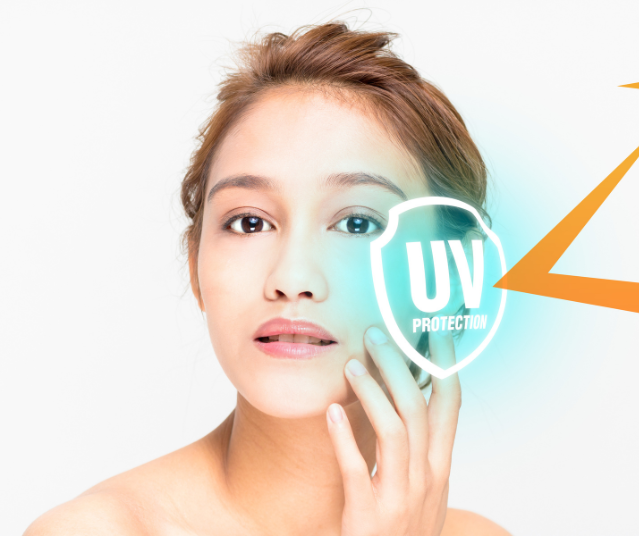
One of the most important steps in any skincare routine is sun protection. Exposure to UV rays can cause premature aging, sunburn, and increase the risk of skin cancer. Therefore, sunscreen is an essential part of your skincare regimen, no matter your skin type.
Tips for Sun Protection:
- Use Broad-Spectrum Sunscreen: Always apply a broad-spectrum sunscreen that protects against both UVA and UVB rays. Look for a sunscreen with an SPF of 30 or higher.
- Choose the Right Formula: For oily or acne-prone skin, opt for a gel-based or mattifying sunscreen that won’t clog pores. For dry skin, use a hydrating sunscreen with moisturizing ingredients like glycerin or squalane.
- Reapply Sunscreen: Don’t forget to reapply sunscreen every two hours, especially if you’re outdoors for extended periods. You can find skincare products like sunscreen sprays or powder sunscreens for convenient reapplication.
5. Targeted Treatments: Address Specific Skin Concerns
Whether you’re dealing with acne, pigmentation, fine lines, or dark spots, adding targeted treatments to your skincare routine can help address specific concerns. Skincare products designed to treat skin issues can make a noticeable difference when used consistently.
Tips for Targeted Treatments:
- Use Spot Treatments for Acne: If you have acne-prone skin, look for skincare products containing benzoyl peroxide or salicylic acid, which help treat acne by reducing inflammation and unclogging pores.
- Serums for Hyperpigmentation: Dark spots and hyperpigmentation can be reduced with serums containing vitamin C, niacinamide, or alpha arbutin, which brighten the skin and reduce the appearance of discoloration.
- Retinol for Anti-Aging: Retinol (vitamin A) is a powerful ingredient for reducing fine lines, wrinkles, and promoting skin renewal. It can be used as a treatment for mature skin or to combat early signs of aging.
6. Be Consistent with Your Routine
Consistency is key when using skincare products. While you might not see results overnight, sticking to a regular skincare routine will yield long-term benefits. It’s important to allow skincare products to work before adding new ones or changing your routine.
Tips for Consistency:
- Follow a Daily Routine: Ensure you’re following your skincare routine every morning and evening. Skipping steps or products can affect how well they work.
- Give Products Time to Work: Avoid switching products too quickly, especially if you’re introducing a new active ingredient like retinol or exfoliants. Give each product at least 4-6 weeks to show results.
- Layer Your Products Correctly: Apply skincare products in order of their consistency: start with the thinnest product (like serums), and work your way to heavier creams and oils.
7. Avoid Harsh Ingredients and Overloading Your Skin
It’s essential to use skincare products that suit your skin and avoid overloading your skin with too many products or harsh ingredients that can cause irritation. Choose gentle products and be mindful of how your skin reacts to each new product.
Tips to Avoid Overloading:
- Don’t Mix Active Ingredients Without Caution: For example, using both retinol and vitamin C in the same routine can irritate sensitive skin. Stick to one active ingredient per routine to avoid overwhelming your skin.
- Patch Test New Products: Always patch test new products, especially if you have sensitive skin. Apply a small amount on your jawline or behind your ear and wait 24 hours to check for any reactions.
8. Adjust Your Routine for Seasonal Changes
Your skin’s needs can change with the seasons. During colder months, your skin may need extra hydration, while in the summer, you may need lightweight products that help control oil.
Tips for Seasonal Skincare:
- In Winter: Focus on thicker moisturizers, hydrating masks, and oils to combat dry air. You may also need to use heavier creams to lock in moisture.
- In Summer: Opt for lightweight, non-greasy products that control oil and protect your skin from sun damage. Don’t forget to use an oil-free sunscreen during the warmer months.
Conclusion
The secret to glowing, healthy skin lies in understanding your skin type and using the best products tailored to your specific needs. Whether you have dry, oily, sensitive, or combination skin, selecting the right cleansers, moisturizers, serums, and treatments will help you achieve a balanced, radiant complexion. Keep in mind the importance of sun protection, hydration, and paying attention to how your skin responds to each product.
